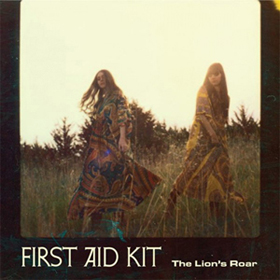‘The Lion’s Roar’
H. V. Cramond
First Aid Kit, “The Lion’s Roar (Bonus Track Version)”
Wichita Records
2012, 11 tracks, $9.99

Hemingway taught that to write about Michigan, one should move to Paris. Johanna & Klara Söderberg, sisters and vocalists of First Aid Kit, somehow managed to write an album that’s of America without being about it, and without having set foot on its soil.
When one thinks of cultural centers in the American West, usually the first things that come to mind are cities. Austin: the weird little brother with the snobbish music collection; Taos: land of writers’ retreats and Georgia O’Keefe; Portland: a sprawl-fighting, fingerstache-sporting Mecca of progressive politics. It’s easy to forget that each city was founded, in large part, due to its location and that these landscapes contribute much to urban culture. Remove culture from the equation, and the idea of the West evokes something downright rural: the idea of an individual in life-or-death battle with his or her surroundings. When describing the beauty of Western scenes, the word “stark” is evoked more often than not.
In these wide expanses, surrounded by mountains and wolves, a person could get lonely. The folk songs that sounded cheery in the bar now sound sad, and the ones that were so depressing are a revelation. If someone else could sing his way through loneliness, perhaps so could you.
“The Lion’s Roar,” First Aid Kit’s second album, taps into that splendid loneliness, embodying the tension between the band’s native Stockholm and American folk traditions, between influence and originality, between the individualistic assertion of one voice alone and the yearning in tight harmonies that often draw comparisons to the Fleet Foxes. Has anything ever sounded lonelier than two sisters singing about love?
The paradoxes inherent in their music are not lost on the Soderberg sisters. In their Amazon.com bio, First Aid Kit explains:
We like bittersweet songs, songs that affect you differently depending on how you interpret them…Making the melodies and lyrics head in different directions is very deliberate…A song like “Emmylou” sounds cheerful, but the lyrics are the saddest thing you ever heard.
Lest you think the Swedish sisters will only push you off a cliff with sweetness, it’s important to note that some of the songs that sound the darkest, both musically and lyrically, have a lyrical redemption. In “This Old Routine,” after coming home to a wife who’s forgotten what she’s looking for, the singer moves from a place of dispassion to a new form of love:
This old routine will drive you mad
It’s just a mumble never spoken out loud
And sometimes you don’t even know why you loved her.
Well you look at her now, and you see why.
The album has clear musical influences, whether it’s an obvious homage such as using the names of classic country stars to describe a relationship as First Aid Kit does in critics’ favorite “Emmylou”—“I’ll be your Emmylou, and I’ll be your June/ If you’ll be my Gram and my Johnny, too”—or featuring a more recent hero, Bright Eyes’ Conor Oberst, on a track (“King of the World”), or a more subtle reference such as the train-song guitars on “The Lion’s Roar” that point to the influence of Johnny Cash. For the Soderbergs, Americana and English have been to them, well, a second language, and one that’s spoken fluently.

H. V. Cramond, Staff Blogger

0 comments on “Review: Cramond”